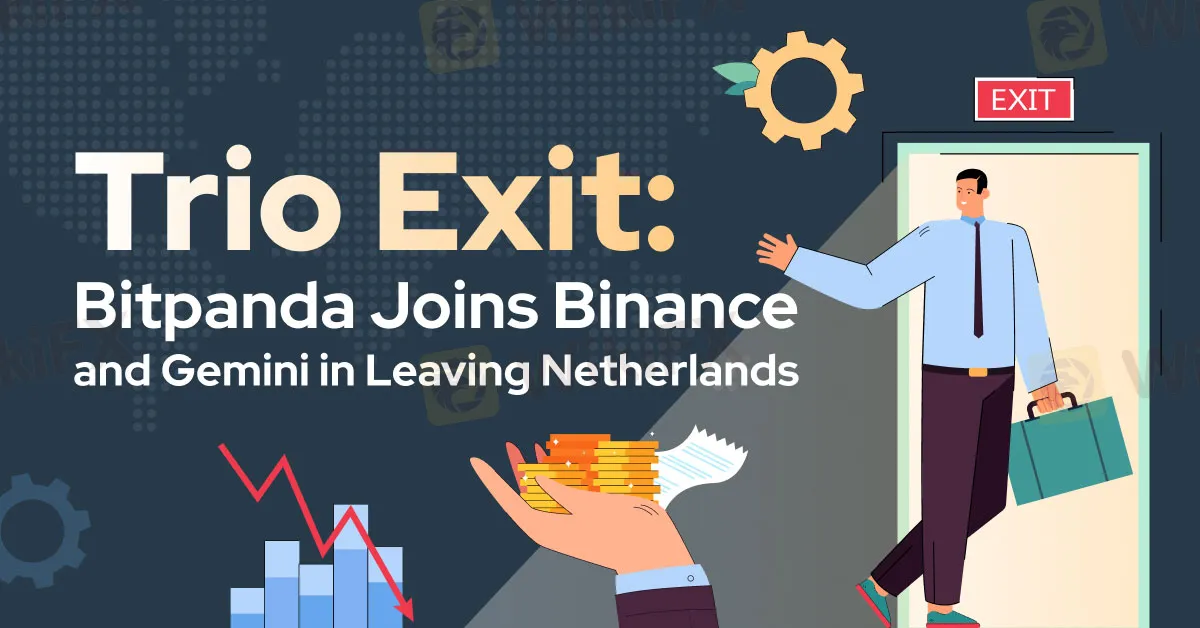简体中文
繁體中文
English
Pусский
日本語
ภาษาไทย
Tiếng Việt
Bahasa Indonesia
Español
हिन्दी
Filippiiniläinen
Français
Deutsch
Português
Türkçe
한국어
العربية
Trio Exit: Bitpanda Joins Binance and Gemini in Leaving Netherlands
Abstract:The cryptocurrency exchange Bitpanda, headquartered in Austria, has strategically opted to cease its operations in the Netherlands from February 1, 2024.

The cryptocurrency exchange Bitpanda, headquartered in Austria, has strategically opted to cease its operations in the Netherlands from February 1, 2024, citing the absence of regulatory approval as the primary reason. This decision, conveyed through recent user communications, is a direct response to the regulatory landscape in the country.
Starting February 1, Bitpanda will not accept new users from the Netherlands. Existing users will only have the capability to withdraw assets, with restrictions on additional purchases, trades, or deposits.

Despite catering to over 4 million users across Europe and holding a dozen European licenses, Bitpanda finds itself unregistered with the central bank of the Netherlands, De Nederlandsche Bank (DNB).
To facilitate a smooth transition for Dutch users, Bitpanda recommends the transfer of cryptocurrencies to Bitvavo. Founded in 2018 and located in Amsterdam, Bitvavo complies with Dutch regulatory requirements as a member of the Dutch Association of Bitcoin Companies. As an added incentive for users transitioning from Bitpanda, Bitvavo currently offers a €10 bonus for new users.
As a member of the European Union, the Netherlands falls under the recently enacted Markets in Crypto Asset (MiCA) legislation, enabling companies to secure a single license in one EU country and operate across the entire union.
Bitpanda's withdrawal mirrors a similar move by Gemini, founded by Cameron and Tyler Winklevoss, who also discontinued services to Dutch customers, citing regulatory requirements from the Netherlands' central bank. However, Gemini expresses intentions to re-enter the Dutch market after aligning its operations with the new regulatory guidelines outlined in the MiCA regulations.
In a parallel development, Binance exited the Netherlands in June, attributing the decision to the rejection of its application to register under the Dutch crypto authorization regime. The inability to obtain registration as a virtual asset service provider (VASP) with the Dutch regulator led to the discontinuation of services for clients in the country.
In a noteworthy restructuring earlier in 2023, Bitpanda underwent a split, resulting in two distinct entities. The cryptocurrency exchange, Bitpanda Pro, has transformed into an independent entity known as One Trading. This strategic split aims to intensify the focus on the development and growth of Bitpanda Pro, with additional funding intended to enhance the capabilities and offerings of One Trading in the cryptocurrency market.

Disclaimer:
The views in this article only represent the author's personal views, and do not constitute investment advice on this platform. This platform does not guarantee the accuracy, completeness and timeliness of the information in the article, and will not be liable for any loss caused by the use of or reliance on the information in the article.
Read more

Coinbase Under Scrutiny Amid Wrapped Bitcoin Delisting Controversy
Coinbase has come under fire after announcing its decision to delist Wrapped Bitcoin (wBTC), a move critics claim could be driven by competitive interests. The delisting, set to take effect on 19 December, has sparked allegations of market manipulation and concerns about fairness in the cryptocurrency ecosystem.

Solana Soars to All-Time High, Hits $264 on Coinbase
Solana hits $264 on Coinbase, breaking its 3-year high with an 11% daily surge. Learn what’s driving SOL's meteoric rise and the crypto market rally.

Mastercard Partners with JPMorgan for B2B Cross-Border Payments
Mastercard and JPMorgan's Kinexys Digital Payments join forces to enhance B2B cross-border payments, promising faster settlements and greater transparency.

Bitcoin Nears $100,000: A Triumph of Optimism or a Warning Sign?
Bitcoin’s meteoric rise continues to capture global attention as its price recently surpassed the $99,000 mark, briefly approaching the $100,000 milestone. This unprecedented rally has led market sentiment to reach a state of “extreme greed,” according to the Fear and Greed Index. Analysts suggest that the market may be entering overheated territory, raising questions about sustainability amidst ongoing enthusiasm.
WikiFX Broker
Latest News
Hackers Charged for $11M Crypto Theft Using SIM-Swaps
Role of Central Banks in the FX Market
FCA Alerts Against Sydney FX
What Makes Cross-Border Payments Easier Than Ever?
Trader Exposes Unethical Practices by STP Trading
Bitcoin Nears $100,000: A Triumph of Optimism or a Warning Sign?
Malaysian Man Loses RM113,000 in Foreign Currency Investment Scam
Mastercard Partners with JPMorgan for B2B Cross-Border Payments
FCA Identifies Clone Firm Exploiting Admiral Markets' Credibility
Coinbase Under Scrutiny Amid Wrapped Bitcoin Delisting Controversy
Currency Calculator


